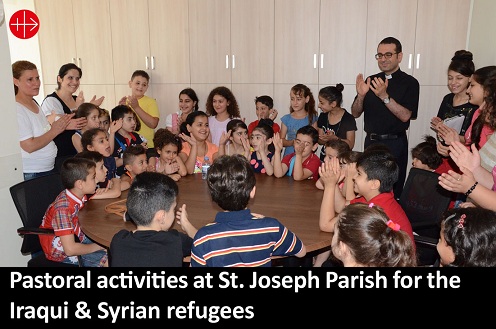Israel’s wall in the Cremisan Valley: the hopes of the Christians of Beit Jala have again diminished
The hopes of the Christians of Beit Jala, a neighbouring town to Bethlehem, have again diminished. Israel’s Supreme Court has now dismissed their lawyers’ most recent petitions. The aim was to force the Israeli army to disclose the precise course of the wall in the Cremisan Valley, which is part of Beit Jala, before construction commenced. The plaintiffs, Christian families and members of Catholic orders, wanted in this way to stop the army creating a situation on the ground in the agricultural area which could not be appealed against. The judges did emphasize the possibility of an appeal. But with the rejection of the petition it is now possible to continue work on the connecting section intended to close a gap in the wall between Israel and Palestine.
“This dismissal has weakened their trust in the justice system and will motivate some people to sell and leave,” Auxiliary Bishop William Shomali explained in an interview with the international Catholic pastoral charity Aid to the Church in Need. In the Latin Patriarchate of Jerusalem he is responsible for the Palestinian areas. “People feel very frustrated and depressed. As for the promise to allow owners to have full access to their land, it is not enough. It means the owners can use their land to plant grapes and olives but not to construct a home. The access itself may be denied in the future, since the land behind the wall will be part of Jerusalem. Going there needs a permit and permits can be denied,” the Bishop said.
The legal dispute between the Christian landowners and the Israeli army has been dragging on since 2006. The proceedings are being followed closely by the media and also by diplomats from the whole world stationed in Israel. Pope Francis has also intervened. But minor successes over the past year have ultimately given way to disillusion. Israel’s Supreme Court as the final arbiter announced that the army could build – on Palestinian soil. 58 Christian families will thus lose their land at the wall sooner or later or will only have limited access to it. Israel justified the planned route by quoting security reasons and defence against terrorism, and it talks of a temporary measure. But the Palestinians regard the course of the wall as a state-organised land grab. They talk of the “annexation wall”. In actual fact the barrier, which meanders over a length of more than 700 kilometres between Israel and the Palestinian areas, has already been built about eighty per cent on Palestinian land and not on the Israeli borderline.
In August last year the excavators advanced in the valley. Ancient olive trees have already been uprooted. The wall is already growing out of the soil. “I have to date lost fifteen olive trees because of the wall. They were many hundreds of years old. It makes my heart bleed,” said Mr Nahmi. “And they intend to take even more from us.” The elderly gentleman, an Orthodox Christian from Beit Jala, is directly affected by the construction of the wall. He doesn’t think much of the agricultural gates in the wall which the army intends to install for the farmers. “This hasn’t worked in the past. For some security reason or other people are then stopped from entering, regardless of whether they have permission or not to take heavy agricultural machinery and workers across to the fields located on the Israeli side. The fact is that our land is lost. The Israelis still apply Ottoman law by which private land passes into state ownership if it hasn’t been cultivated for ten years.”His nephew Xavier agrees with him. The Chilean-born Palestinian quite consciously decided to return to the home of his forefathers. The young Catholic said: “For four years we have celebrated Holy Mass and prayed every Friday in the olive groves so that we will be spared what is now happening. I said to our critics that prayer and non-violent resistance pay off. But what can I say now?”
Mrs Ilham is also affected by the planned wall. “It’s very difficult for us. A catastrophe,” the teacher from Beit Jala said. “The land has belonged to us for generations. It’s not only about the fruit that we grow there. It’s about our history, our bond with our homeland which is being taken from us.” This seventy-year-old lady understands it when young people from Beit Jala think about emigrating. “But where can we go? After all, this is our home. Everywhere else we are strangers.”
Oliver Maksan.






